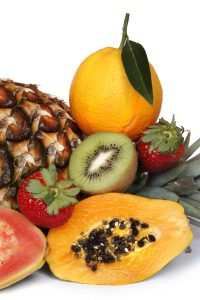Today’s Cancer Research Update features a study that suggests eating plenty of fruits and vegetables may slightly reduce women’s risk of breast cancer. Every 200 grams of fruits and vegetables eaten per day – about 1 to 2 cups – was associated with a 4 percent decreased risk of breast cancer.
What does a cup of fruits and vegetables look like? A small apple, an orange and a dozen baby carrots are a few examples. Look at the CDC for more.
The research was funded by the World Cancer Research Fund as part of AICR/WCRF’s Continuous Update Project (CUP), an ongoing review of cancer prevention research. Here, lead author Dagfinn Aune, a nutritional epidemiologist at Imperial College London who is part of the CUP team, answers a few questions about the findings.
Q: Every 200 grams of fruits and vegetables linking to a 4% reduced risk of breast cancer does not seem like a lot. Can you explain why it’s important?
A: Yes, the reduction in relative risk is modest, but the increment that was used for the analysis was also moderate so the reduction in risk may be larger for women that eat greater than 200 grams per day of fruit and vegetables. For those with the highest intake of fruit or fruit and vegetables combined there was a 8 to 11 percent reduction in the relative risk compared with those with the lowest intake, which is similar to our previous results for colorectal cancer. The association appears to be linear, meaning more benefit the more you eat.
Even if the association is relatively weak, breast cancer is the most common cancer among women and on a population level these results could account for an important number of breast cancer cases because everybody eats. In addition, there may be problems (measurement errors) in the assessment of fruit and vegetable intake that may obscure associations between dietary intake and disease risk.
Q: How do these findings compare to your recent study about how fruits and vegetables lower colorectal cancer risk?
A: There are both similarities and differences in the two findings. For the high versus low analysis and the linear dose-response analysis, the risk estimates were similar – there was about a 10 percent reduction for high versus low intake. But for colorectal cancer risk we found evidence of a nonlinear association — meaning that most of the reduction in the relative risk was found when increasing fruit and vegetable intake to 100 or 200 grams per day. For breast cancer we found that the association appeared to be linear so that the more you eat the better it is.
Q: The risk was slightly more reduced when looking at just fruit but not vegetables. Why do you think that is?
A: We can only speculate about the reasons why there was an association with fruit, but not vegetables. Some nutrients and antioxidants are destroyed during cooking and apart from salads, vegetables are often eaten boiled, while we tend to eat fruits raw. That might be one explanation, but we really don’t know at this moment.
Q: Most of the studies adjusted for obesity. If you rule that out, what do you think are the likely reasons why fruits/vegetables may reduce risk?
A: Fruits and vegetables are good sources of dietary fiber and we have previously shown an inverse association between dietary fiber intake and breast cancer risk. Greater intake of dietary fiber may interfere with the re-absorption of estrogens in the colon and thus reduce circulating estrogen concentrations. In addition, fruits and vegetables are sources of a myriad of antioxidants and phytochemicals that may prevent cancer by inducing detoxifying enzymes and reducing oxidative stress and inflammation.
Q: I know you’re beginning to look at breast cancer survivorship, do you see this finding also translating to reducing recurrence for survivors?
A: We are working on the analyses of fruit and vegetables and breast cancer survival, but it will probably take at least a year before the report on breast cancer survival is ready for publication. Meanwhile, before we have any firm data available breast cancer survivors are advised to follow the general recommendations for cancer prevention, including eating at least 400 grams per day of fruits and non-starchy vegetables per day.






It’s a very useful research to prevent cancer. We always have to get used to eat fruits and vegetables every day. But in fact, most people prefer fast food that is less beneficial to the body.
It’s a very useful research to prevent cancer. We always have to get used to eat fruits and vegetables every day. But in fact, most people prefer fast food that is less beneficial to the body.
Please let me know how many servings of Non Starchy Vegetables and Fruits would be helpful in reducing risk of Beast Cancer with positive genetic back ground?
Please let me know how many servings of Non Starchy Vegetables and Fruits would be helpful in reducing risk of Beast Cancer with positive genetic back ground?